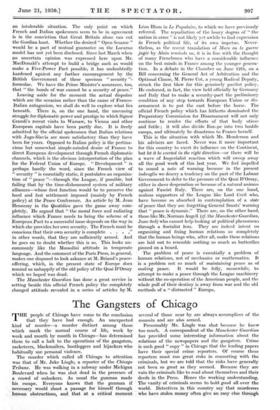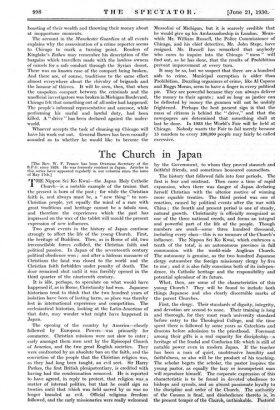The Gangsters of Chicago
T'people of Chicago have come to the conclusion that they have had enough. An unexpected kind of murder—a murder distinct among those which mark the normal course of life, week by week and month by month in Chicago--has determined them to call a halt to the operations of the gangsters, racketeers, blackmailers, bootleggers and hijackers who habitually use personal violence.
The murder which called all Chicago to attention was that of Mr. Jake Lingle, a reporter of the Chicago Tribune. He was walking in a subway under Michigan Boulevard when he was shot dead in the presence of a crowd of onlookers. As usual the gunman made his escape. Everyone knows that the gunman if necessary would shoot a passage for himself through human obstructions, and that at a critical moment several of those near by are always accomplices of the assassin and are also armed.
Presumably Mr. Lingle was shot because he knew too much. A correspondent of the Manchester Guardian has provided some interesting information about the relations of the newspapers and the gangsters. Crime is such good " copy " in Chicago that the leading papers have their special crime reporters. Of course these reporters must run great risks in consorting with the criminals, but we are told that the risks have generally not been so great as they seemed. Because they are vain the criminals like to read about themselves and their deeds in the Press. Hence the working understanding. The vanity of criminals seems to hold good all over the world. Detectives in this country say that murderers who have stolen money often give an easy clue thrdugh boasting of their wealth and throwing their money about moments. at inopportune moments.
The account in the Manchester Guardian at all events explains why the assassination of a crime reporter seems to Chicago to mark a turning point. Readers of Kinglake's Eothen may remember his description of the bargains which travellers made with the lawless owners of camels for a safe conduct through the Syrian desert. There was no knoirn case of the compact being broken. And there are, of course, traditions to • the same effect almost everywhere about the chivalry of brigands and the honour of thieves. It will be seen,' then, that when the unspoken compact between the criminals and the unofficial investigators was broken in Michigan Boulevard, Chicago felt that something out of all order had happened: The people's informal representative and assessor, while performing his useful and lawful duty, had been killed. A " drive " has been declared against the under:. world.
Whoever accepts the task of cleaning-up Chicago will haVe his work cut out. General Dawes has been casually sounded as to whether he would like to become the Mussolini of Michigan; but it is scarcely credible that he would give up his Ambassadorship in London. Mean- while Mr: Williain Russell, the -Pollee Commissioner of Chicago, and his chief detective, Mr. John Stege, have resigned. Mr. Russell has remarked that anybody who cares to inquire into the Chicago " mess " wilt • find Out, as he has done, that the results of Prohibition prevent improvement at every turn.
It may be so, but we suspect that there are a hundred aids to crime. Municipal corruption is older' than Prohibition. Dazzling organizers Of eritne, like Al Capone and Buggs Moran, seem to have a finger in every political pie. They are powerful because they can always deliver the money to their agents ; and so long as justice Can be deflected by 'money the guntnen will not be unduly frightened. Perhaps the best present sign is that the mass of citizens is behind the " drive," and that the newspapers are determined that something shall at last be clOne. In 1983 the- World's Fair will be held at Chicago: Nobody wants the Fair to fail merely because 15 murders to every 100,000 people may fairly be called excessive.









































 Previous page
Previous page